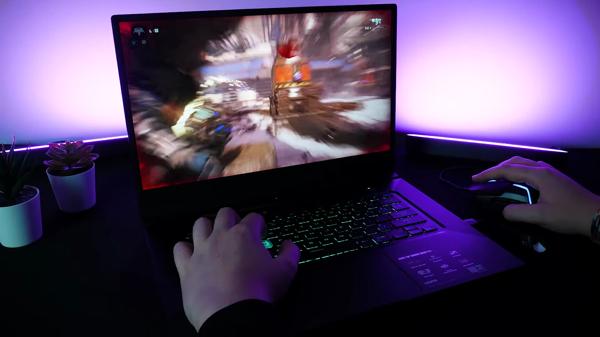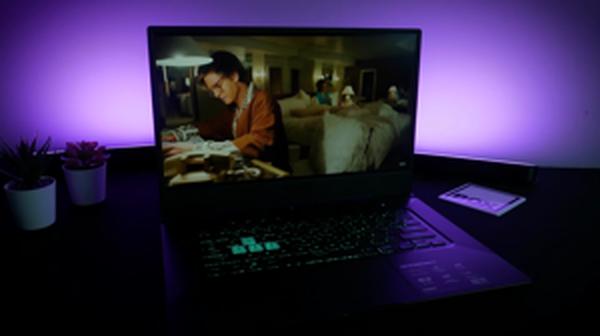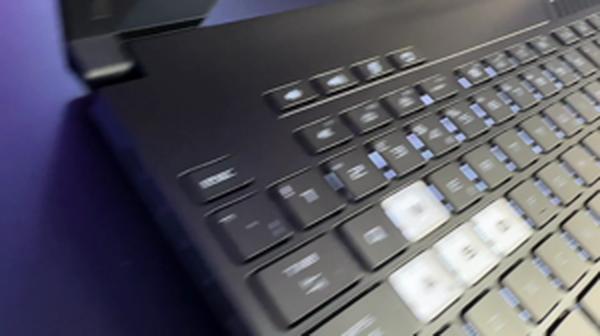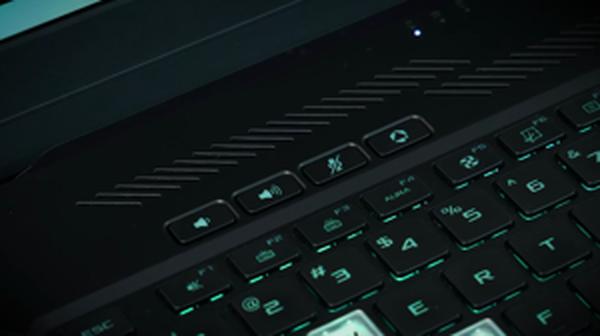Gaming with the ASUS TUF Dash 15 Laptop: my take (2023)
Introduction
I've been working with and gaming on the ASUS TUF Dash 15 for the past weeks, testing it as a daily driver for both. I value both performance and affordability, both of which this laptop seems to deliver. Below are my impressions.
Hardware Capabilities and Performance Benchmarks

Having spent a considerable amount of time with the ASUS TUF Dash 15, I've put it through the wringer with various games and work tasks to really see where it shines and where it could use a buff.
Performance-wise, you're getting a solid rig with the TUF Dash 15. Here's a quick rundown:
- Intel i5/i7 CPUs: Whether you opt for the i5 or i7 variant, the processor packs a punch and handles intense multitasking with ease.
- NVIDIA RTX 3060: The 3060 is a strong mid-range card. It won't blaze through the very latest titles on Ultra at 4K, but it sure will give you an enjoyable 1080p gaming experience.
- RAM and Storage: With options to start at 16GB of RAM and expandable storage solutions, this machine is ready for most challenges.
Straight out of the box, the TUF Dash 15 had me nodding in approval. Launching games like Fortnite and GTA V was a breeze, with respectable framerates on high settings. Title like Genshin Impact and more casual picks such as Roblox ran as smooth as butter.
However, not everything is a pros list. When I started pushing the laptop with more demanding tasks, I saw the GPUs struggle to keep up with the demands of the latest AAA games on higher settings. For future-proofing, this might be a concern to some.
In terms of user experience, the keyboard felt tactile and responsive, which is a bonus for both gaming and typing. The display, while not top of the range in terms of color gamut, was more than satisfactory for gaming with its high refresh rate - a visual treat when it comes to fast-paced action.
Another high point is the upgradeability; having additional slots for RAM and SSD means this laptop can grow with your needs.
But, it's not all roses. On the downside, the Wi-Fi card seemed to be on the cheaper side, which led to some frustrating drops in connectivity. And while the array of ports is decent, I did find myself wishing for more USB-A ports on occasion.
While these drawbacks are noteworthy, they don't overshadow the overall positive impression the ASUS TUF Dash 15 leaves. Especially when you consider the balance between performance and portability, it's a powerful machine that will cater to the gaming-on-the-go audience quite effectively. Sure, there are areas with room for improvement, but as is, the TUF Dash 15 stacks up pretty well against the competition in its price bracket.
Thermal Management and Battery Life Concerns

Based on my time with the ASUS TUF Dash 15, the laptop's thermal management and battery life have been points of regular observation. Any gaming laptop worth its salt should be capable of delivering stellar performance while keeping its cool, quite literally. Here's a rundown of the Dash 15's prowess and challenges in these areas:
Pros:
The laptop's hardware doesn't fail to impress, delivering consistent performance even during intensive gaming sessions or heavy multitasking.
The built-in fans, though audible under heavy loads, are effective in preventing any significant thermal throttling.
When the NVIDIA RTX 3060 gets into full swing, it manages to stay within acceptable temp ranges—impressive, given the hardware packed into such a slim profile.
Fast charging is a boon, recharging the device quickly, which somewhat compensates for the shorter battery life.
Cons:
The laptop gets notably warm, especially above the keyboard, which is somewhat to be expected but can be a discomfort for long gaming sessions.
Battery life during gaming is suboptimal, which is par for the course with gaming laptops, but still a point to consider for those needing on-the-go versatility.
The necessity of lowering screen brightness and other settings to eke out a bit more battery life is a compromise, though an expected one.
While using the laptop, I keep a close eye on CPU and GPU temperatures. I use HWMonitor or Armoury Crate to track the degrees during those marathon gaming sessions. A cool system means stable gameplay and longevity for the components.
The battery life, however, requires some expectation management. I get anywhere from 2 to 4 hours of juice while running less demanding tasks, which is manageable for short stints away from an outlet. Gaming unplugged? That's a different story, where I squeeze out about an hour or so before needing a charge.
Let's not forget that with power comes the need for that AC adapter tether. Gaming laptops like the TUF Dash 15 are beasts when connected to power, but they transform to mere mortals once unplugged. This is a trade-off that needs to be accepted with high-performance portable rigs.
In summary, the ASUS TUF Dash 15 demonstrates commendable heat dispersion, vital for maintaining peak performance. However, the portability factor takes a hit due to the limited battery life. Keeping a charger handy and managing expectations regarding mobile gaming are essential with this device. Its slim form factor, though, makes it easier to slip into a bag, ready to be unleashed whenever an outlet is nearby.
Upgradability and Customization Potential

When it comes to the ASUS TUF Dash 15, the potential for upgradability and customization is a significant draw for those of us who see our laptops not just as tools, but as companions on our digital adventures. Here's a quick rundown of the possibilities:
RAM: Thankfully, the laptop comes with two SODIMM slots for memory upgrades. Starting with a decent 16GB, you have the option to go all the way up to 32GB or even more, depending on your needs and the specs supported by the motherboard.
Storage: With not just one, but two NVMe slots at your disposal, the storage possibilities are vast. It ships with a 512GB SSD, which is enough to get started, but if you're a content creator or a game hoarder, you'll likely eye the second slot for an easy and significant storage boost.
Software: ASUS' pre-installed Armoury Crate software does give you some control over your system's performance profiles and lighting settings, though it can be a bit finicky.
The process of opening up and upgrading the ASUS TUF Dash 15 is pretty straightforward, a blessing for those of us not wanting to spend hours with a screwdriver and an instruction manual that looks more suited to constructing a spaceship.
However, there are a couple of points to note on the flip side. First, the included SSD—while decent—is a PCIe 3.0, not the lightning-fast 4.0 we've begun to love. This detail is somewhat disappointing considering the presence of a 4.0 slot, and using the most out of this laptop power-wise might mean pulling a rollback to install your super-fast SSD as your boot drive.
Then there's the BIOS and software updates scenario. You might find yourself on a treasure hunt for the right update or driver that blissfully ignores your personal drama with Armoury Crate. And while the chassis is friendly to get into, it's worth being cautious—some users have reported stubborn screws that could turn an upgrade into a wrestling match.
On the whole, the ASUS TUF Dash 15 dances in a league where it's expected to handle big games and heavy-duty tasks but doesn't forget the user’s urge to tinker. I see the laptop as a base camp for future upgrades, potentially elongating its life span and keeping it relevant in the ever-rapid march of technology. Sure, it's not perfect—what is?—but the roadblocks aren’t insurmountable, and the payoff in performance and satisfaction could be huge.
Value for Money and Final Verdict

When you're balancing the line between performance and budget, the ASUS TUF Dash 15 feels like it hits the sweet spot. From my own experience, this machine has several key selling points that justify its price, even though it isn't without its drawbacks.
Here's a quick rundown of what stands out:
Performance: No question, it can handle the current gaming landscape fairly well with an i5 or i7 and the RTX 3060 in tow.
Portability: It's not the lightest out there, but for a gaming laptop, it's quite manageable on the go.
Design: Sleek enough for a professional setting and doesn't scream "gaming rig" at first glance.
Upgradability: The additional slots for RAM and SSD mean you're not stuck with initial specs.
However, the chinks in the armor are also quite apparent:
Battery Life: It's just not cut out for long stints away from a power source.
Heat Management: Stays within safe limits during heavy use, but the fans can get loud, and the device can get uncomfortably warm.
The connectivity had some hiccups with Wi-Fi speeds not always being on par with my old laptop, despite updates, but it wasn't a deal-breaker. As for the user interface, the keyboard layout and trackpad are decent – functional and responsive, albeit lacking some pizzazz or features found in higher-end models. You won't find a Windows Hello camera or a fingerprint sensor for that quick log in, which could be a downside depending on your preferences.
One thing I keep circling back to is the trade-off with the battery. While it's frustrating that the battery life is underwhelming, it does charge quickly, especially with USB-C. For those who are desktop-bound but still desire the occasional portability, this might be a reasonable compromise.
In terms of support and software, navigating the ASUS ecosystem was straightforward, though not without its befuddling moments—Armory Crate isn't everyone's cup of tea, and some might find it more cumbersome than beneficial.
Final Verdict: After weighing everything, the ASUS TUF Dash 15 presents significant value for money. While it's not perfect – no laptop in its range really is – it provides ample gaming and multitasking prowess that's tough to beat at its price point. The drawbacks, primarily the battery life and the heat, are factors to consider, especially if you're frequently on the move. But if you're like me, primarily using it for mixed work and play in environments where you can plug in, you'll likely find a lot to like in this robust and somewhat stylish package.
Share